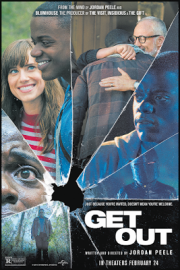Get Out
It’s not unusual for me to deliberately ignore reading about a movie I really want to see if I do not get to it immediately after it is released. When it’s a word-of-mouth hit, or a cultural flashpoint, that can be difficult to do. Such was the case with Jordan Peele’s “Get Out,” which is one of the smash hits of this young movie year, which I finally found time to watch yesterday, more than a month after its release. The success of the film over the past month, and my fandom of Peele after TV’s “Key & Peele,” gave me outsized expectations of what to expect. What I got was a straight-up horror film, with some amusing observational humor, and some fascinating racial observations that went places I did not expect the film to go. It’s probably one of the most imaginative pieces of horror filmmaking since “The Cabin in the Woods.”
Chris (Daniel Kaluuya) is getting ready to go with his girlfriend Rose (Allison Williams) to her parent’s house for the weekend. Chris is nervous, because he’s black, and she’s white, and he’s never met her parents before. She tells him not to worry, though, because they are not racist; she tries to comfort him by telling Chris her father would have voted for Obama a third time if he could. As they are driving, they hit a deer darting across the road; when the white cop comes to take the report, immediately things start feeling off for Chris, but Rose is there for him, and doesn’t appreciate the insinuations the cop is making. Things feel a bit better for Chris when he meets Dean (Bradley Whitford) and Missy (Catherine Keener), Rose’s parents, but Chris is still on high alert, especially when he notices something off about the few black people he meets in this very white environment. That Rose’s parents have black servants (Betty Gabriel and Marcus Henderson) feels particularly weird, but not as much as when the young, black husband of one of Dean and Missy’s friends exhibits some strange behavior.
The obvious reference point Peele is working from with “Get Out,” when you base your view solely on the trailers, is “The Stepford Wives” or “Rosemary’s Baby,” and that’s a good place to start with your thinking on the film, but Peele has a few other layers for you to, er, peel off as the film unfolds. On the one hand, I want to discuss those layers of the film, because they’re a big part of the reason the film ultimately worked for me, but on the other hand, the fact that I didn’t know what to expect going in was a big reason why the film struck a nerve. I can say this, though- hot-button issues such as race appropriation and the Black Lives Matter movement (at least the spirit of the movement, and what it is against) make their way into the film, and not in ways you will necessarily expect. This doesn’t work without a strong performance by Kaluuya as Chris, though, and the actor (who will be appearing in Marvel’s “Black Panther”) does a great job with what Peele asks of him here. Because of Peele’s reputation as a comedy talent, I was expecting much more of a blend between horror and comedy here, but I love that he’s showing off his chops as a capable horror filmmaker, and is able to do so while telling a story that fits in with the sort of observational racial commentary he and Keegan-Michael Key thrived on in “Key & Peele.” He’s promised more films like “Get Out” in the wake of the film’s stunning success, and I, for one, cannot wait to see what that looks like.










